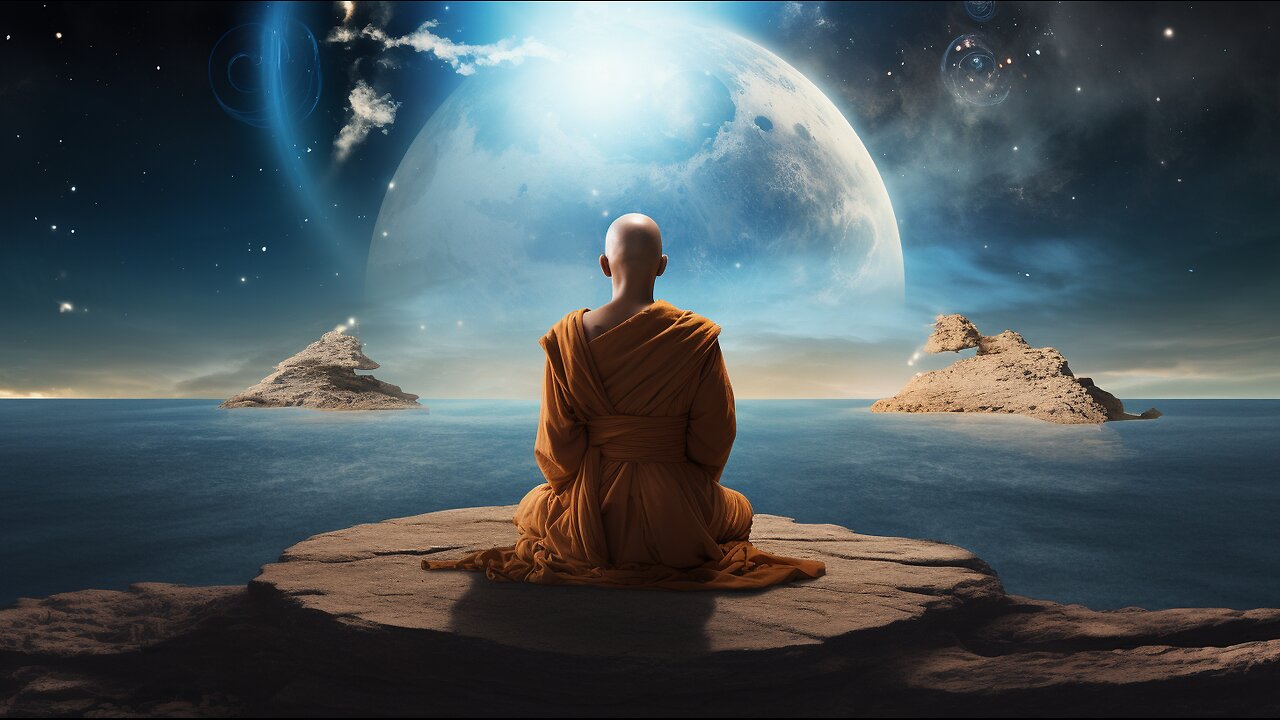Premium Only Content

Rescued in the Desert by The Buddha
20240221
In the hustle and bustle of our fast-paced world, where the desert of life sometimes seems endless, there was once a bold and ambitious disciple of the Blessed One, a true seeker of truth. Fueled by a fire of passion and zeal, he embarked on a solitary meditation journey, vowing to traverse the arid landscapes of his own mind. Yet, in a moment of vulnerability, he faltered. Doubt crept in, whispering that he belonged to the lowest echelons, destined to wander aimlessly without finding the path or its fruitful rewards.
Discouraged, he abandoned the solitude that once cradled his aspirations and returned to the bustling Jetavana, the urban oasis where seekers gathered. Concerned fellow disciples chided him, "You've strayed from the path, brother. You took a vow and abandoned it." With judgment in their eyes, they dragged him before the Master.
As the Blessed One observed the unfolding scene, he spoke, "I see you've brought this brother against his will. What transgression has he committed?"
"He took vows, Lord, but abandoned them to return to us," they replied.
The Blessed One turned to the disheartened disciple, "Is it true that you've given up?"
"Yes, Blessed One," came the somber acknowledgment.
The Master's eyes softened, and he spoke words that carried the weight of ancient wisdom, "This life of yours is a precious moment. If you falter now, remorse may haunt you in future existences. Why, my brother, have you become so irresolute? In past lives, you were resolute and determined. Through your energy, the men and bullocks of five hundred wagons found water in a sandy desert and were saved. Why surrender now?"
These words rekindled a spark within the disciple, restoring his wavering determination. Others, intrigued, implored the Blessed One, "Lord, reveal to us the tale of his past deeds."
"Listen, then, seekers!" declared the Blessed One, preparing to unveil a hidden tale obscured by the veils of rebirth.
Once upon a time, in the realm where Brahmadatta ruled in Kasi, the Bodhisattva emerged in a merchant's family. As he matured, he delved into the world of commerce, navigating the terrain with five hundred carts laden with hopes and goods. On one fateful day, his journey led him to a vast, sandy desert, where the grains of sand were so fine that they slipped through clenched fists like elusive dreams.
The relentless sun transformed the desert into a blazing inferno, rendering it impassable during the day. Travelers devised a strategy—venturing forth under the cloak of night, seeking refuge from the searing heat. These intrepid merchants, our protagonist among them, marched through the night, forming makeshift encampments at dawn to rest in the shadow of life's challenges.
This desert, however, was not just a physical terrain but a metaphorical expanse reflecting the trials of existence. It demanded navigation akin to a sea voyage, necessitating the guidance of a desert-pilot who understood the celestial map. The Bodhisattva, like a captain steering his ship through the night, rested on cushions, scrutinizing the stars to guide the caravan.
In a cruel twist of fate, wearied by the relentless journey, the desert-pilot succumbed to fatigue, oblivious to the fact that the oxen had, in their weariness, reversed course. The caravan inadvertently retraced its steps through the night. At dawn, as the encampment took shape once more, the realization struck—they had circled back, trapped in a cyclical mirage.
Despair settled like a heavy shroud over the caravan. Wood and water dwindled, and despondency shadowed each traveler. The Bodhisattva, however, refused to succumb. In the coolness of the morning, he wandered, eyes searching for a sign of hope. A tuft of kusa-grass caught his attention, a lone survivor in the vastness.
His discerning mind sparked an idea—this resilient grass must have drawn sustenance from water below. Ordering a spade, the Bodhisattva directed the digging. Sixty cubits deep, they encountered a rock. Hope flickered, then dimmed. Yet, undeterred, the Bodhisattva descended into the well, perched on the rock, and listened intently. The sound of gurgling water beneath reached his ears, and he emerged triumphant.
"Have heart, my lad," he urged his page. "This rock guards the lifeblood below. Break it and let the waters flow."
The determined page, armed with an iron hammer, descended into the abyss. As onlookers held their breath, he struck the rock. It fractured and fell, revealing a source of life—a gushing stream that quenched the thirst of all. The weary travelers bathed, cooked, and fed their oxen. A flag marked the well, a symbol of triumph over adversity.
Buoyed by their success, they reached their destination, selling their merchandise at a profit. Each, in the end, met their destiny based on deeds—actions that rippled through the fabric of existence. The Bodhisattva, true to his compassionate nature, gave generously and met his end in alignment with his virtuous deeds.
The Blessed One concluded the tale, weaving the threads of past and present, "The caravan, that was the Bodhisattva, the future Buddha; the page, who faced the challenge head-on, was this brother without perseverance; and the others, mere attendants on the Buddha."
In the echo of these ancient words, the disciples absorbed the timeless wisdom—imbued with the modern flair of a tale that transcends time and culture. The message resonated, a beacon in the contemporary desert of doubt and despair: never underestimate the power of determination, even in the face of seemingly insurmountable challenges.
If you like this story and would like more, I would greatly appreciate you subscribing to the channel and hitting that like button. It costs nothing to help out.
-
 24:05
24:05
Glenn Greenwald
14 hours agoAs U.S. Censorship Escalates, New Poll Reveals Declining Support for Israel: UNLOCKED Episode
166K132 -
 2:14:50
2:14:50
We Like Shooting
1 day ago $8.93 earnedWe Like Shooting 606 (Gun Podcast)
52K5 -
 1:00:41
1:00:41
Donald Trump Jr.
15 hours agoMake Main St Great Again, Interviews with Alex Marlow & John Phillips | TRIGGERED Ep.233
188K55 -
 1:45:23
1:45:23
megimu32
11 hours agoON THE SUBJECT: 2008 Called.. It Wants Its Chaos Back!
64.5K20 -
 1:01:53
1:01:53
BonginoReport
13 hours agoPolitical Violence on the Rise in America - Nightly Scroll w/Hayley Caronia (Ep.26) - 04/14/2025
169K104 -
 1:32:42
1:32:42
BlackDiamondGunsandGear
7 hours agoThey Don’t want you to Purchase 2A Related Products?
53.9K4 -
 2:53:36
2:53:36
Joe Pags
11 hours agoThe Joe Pags Show 4-14-25
111K -
 56:14
56:14
Sarah Westall
11 hours agoGlobal Agenda: Starve Small Business of Funds w/ Bruce De Torres
92.2K24 -
 2:17:29
2:17:29
2 MIKES LIVE
14 hours ago2 MIKES LIVE #205 with guest Nick Adams!
67.1K -
 54:38
54:38
LFA TV
17 hours agoThe Bread of Life | TRUMPET DAILY 4.14.25 7PM
66.7K16